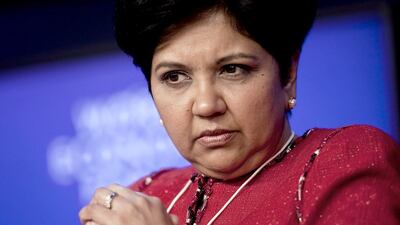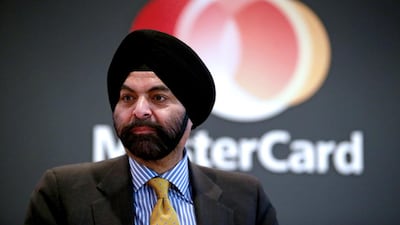From PepsiCo to Google, Indians are increasingly rising to the top roles in some of the world’s biggest companies.
A number of factors are contributing to India becoming a breeding ground for global business leaders, including the country’s sharp focus on education and its citizens’ ability to integrate themselves into different cultures, experts say.
The most recent high profile example of the trend came this month when Sundar Pichai, who was born and grew up in Chennai, took charge as the chief executive of Google. Also from Chennai, Indra Nooyi is the chief executive for PepsiCo. Meanwhile, Ajaypal Singh Banga from the city of Pune in Maharashtra leads Mastercard, while Ivan Manuel Menezes, also from Pune, heads the beverages giant Diageo. Satya Nadella from Hyderabad is in charge of Microsoft.
In recent decades, a large number of Indians have moved to the United States and the United Kingdom to further their education after graduating from top institutions in India such as the Indian Institutes of Technology (IIT) and the Indian Institutes of Management (IIM). Those graduates have since risen to leading positions, explains Arun Bala, the chief operating officer at Invenio Business Solutions.
“That is one of the factors that have brought Indians to the fore at this time,” he says. “You’re talking about some of the best that have been produced as graduates in India that have moved to the US over a period of about 30-odd years,” he says. “That’s a substantial number of academically bright and highly ambitious youth that have migrated to the UK and US.”
Cultural factors also play a significant role in the success of Indians as business leaders globally.
“In India, it’s a highly competitive education system and it requires students to work for anywhere between 14 and 16 hours every day,” says Mr Bala. “This hard work and [ability to] cope with stress is something people in India, especially from the previous two decades and beyond, would have learnt right from middle school or high school. That’s something that is part of the cultural DNA of almost every Indian.”
Indians are also able to adapt easily to life in different countries, which is essential when it comes to business leadership, he says.
“They integrate a lot more into the local culture, whether it’s in America, the UK or Europe – much better than many of the other migrants. Other migrants tend to retain their identity, [while] Indians, in addition to retaining their identity, also merge and fuse into the local culture much better than many others.”
The fact that educated Indians grow up speaking English is another major advantage allowing them to succeed in the business world.
“India has one-sixth of the world’s population,” says Satish Modh, the director of the Vivekanand Education Society Institute of Management Studies and Research in Mumbai. “In future there may be many more business leaders from India simply because of its demographic advantage. In the past five decades India has been able to create an ecosystem of higher education in the form of IITs and IIMs, which promote meritocracy. Many of these graduates have now reached top positions in the companies where they work.”
Many point out that it is “jugaad”, which in India refers to finding a creative way of addressing problems and is embedded in Indian culture, that has contributed to the country’s rise in the business world.
Uday Salunkhe, the group director of the Welingkar Institute of Management Development and Research, which has branches in Mumbai and Bangalore, says that Indians have an “ability to find simple yet innovative solutions around seemingly unsolvable problems”.
“Coming from a country like India, which is the size of a subcontinent, with its geo-political-religious plurality and heterodoxy, these leaders understand the importance of speed across boundaries, value of collaborations and handling diversity of cultures, and combine all of it with an essence of humility.
On his first day as the chief executive of Microsoft, Satya Nadella sent an email to employees saying it was “a very humbling day” for him, for example.
“It is also seen that Indian business leaders believe in investing in people development [and] attempt a higher level of employee engagement, which is more than their foreign counterparts [do],” says Mr Salunkhe.
There is a sense of pride within India when it comes to those who have done well abroad, as Indians have emigrated to different parts of the world in search of opportunities in education and business to realise ambitions “that would probably have been harder to achieve on home soil”, he adds.
Milind Kamat, the executive vice president of sales at TechProcess Payment Services, an online payments company in India, spent 14 years in the US, completing a master’s degree and working in senior roles, before returning to his home country.
He says Indians find it easier to work abroad in countries such as the UK and the US, which are relatively structured, because of their experience of the more chaotic market of India.
Globalisation is another driver of Indians’ growth in business, with the country striving to improve its position by “inviting the best practices from outside of India and marrying them into the best practices of India”.
Previously, a dearth of opportunities was driving Indians abroad, he says. But that has changed.
“Prior to the year 2000, it was an easy choice to make — go outside of India,” says Mr Kamat. “Now, I think there is tremendous opportunity in India and you see people returning after 15 years of service. I think the general standards of living are better outside of India. That is one factor that tends to take people away. People who are just out of college tend to look at aspects including how much they will earn and the standard of living.”
Last week, Promoth Manghat became the chief executive of UAE Exchange. He moved to Abu Dhabi in 2003, having worked in India and completed his education there.
He believes that education is a critical factor in Indians managing to take up key positions abroad.
“Indian parents, no matter which strata of the society they belong to, have always instilled the value for education in their children,” he says. “If Indians are doing well today, it is because of the investment made in education. Indians are cultured to be inquisitive by nature. They are fuelled by the hunger to do well in everything that they take up.”
Mr Manghat says the increase in the number of global business leaders will in turn aid India’s economy by raising recognition of the strength of local talent and attracting investment.
He attributes his own success in large part to his native country.
“India instilled strong values in me. I take pride that I am part of one of the oldest civilisations, which has passed on a rich heritage as legacy with an emphasis on education, right through,” says Mr Manghat.
“From India I acquired a fire to achieve the best, a competitive spirit and a curiosity to explore new realms. These very same attributes help me in finding solutions to the most complex of corporate issues now. Whether it was streamlining processes at UAE Exchange or negotiating complex business deals, I have always turned to my inner self, which is enriched by the values bequeathed by India, which cannot be substituted by any B-school curriculum.”
business@thenational.ae
Follow The National's Business section on Twitter




